Last week, the National Post (a Canadian center-right newspaper owned by an American hedge fund with close ties to the GOP) published an EXCLUSIVE scoop about Prime Minister Mark Carney:
The National Post obtained a copy of Carney’s 1995 thesis for his doctorate in economics from Oxford University titled “The Dynamic Advantage of Competition.” It shows 10 instances of apparent plagiarism, according to the judgment of three university academics who reviewed the material.
This scoop is relevant to me and my audience because so many of my own scoops have been about plagiarism, including my biggest, which forced Claudine Gay to step down as president of Harvard.
The National Post lays out 10 alleged instances of Carney’s plagiarism, and I’ll start with the first 5:
“Domestic profitability is not a good indication of true international competitive advantage for three important reasons.” — Michael E. Porter, The Competitive Advantage of Nations, 1990, p. 797.
“There are three reasons why domestic profitability is not a good indicator of true international competitive advantage.” — Carney thesis, 1995, p. 206.
“First, government intervention can impede international competition and artificially support domestic profits.” — Porter, 1990, p. 797.
“First, government intervention can impede international competition and artificially support domestic profits.” — Carney thesis, 1995, p. 206.
“Second, in an industry or economy where many firms are following harvesting strategies, firms may maintain profitability though they are losing competitiveness. Finally, differences in accounting standards in preparing financial statements make cross-national comparisons in profitability problematic, as does the lack of systematic data in many countries.” — Porter, 1990, p. 797.
“Second, in an industry or an economy where many firms are following harvesting strategies, firms may maintain profitability even though they are losing competitiveness. Third, differences in accounting standards and the lack of systematic data prevent international comparisons.” — Carney thesis, 1995, p. 206.
“Social norms and values affect the nature of home demand…” — Porter, 1990, p. 129.
“Second, social norms and values affect the nature of home demand.” — Carney thesis, 1995, p. 90.
“Related industries are those where firms can share activities in the value chain across industries (for example, distribution channels, technology development) or transfer proprietary skills from one industry to another.” — Porter, 1990, p. 782.
“The former are industries which share activities in the value chain across industries (e.g., distribution channels or technology development) or transfer proprietary skills between them.” — Carney thesis, 1995, p. 84.
Frankly, these are very minor accusations—too trivial to even weaponize for political ends… and keep in mind: I’m saying this as someone who will definitely not be voting for Carney in the upcoming federal election on April 28, 2025.
Carney’s thesis revolves around Porter’s work, and cites Porter dozens of times before and after each of these 5 alleged infractions. Is it shocking that he echoes Porter’s phrasing while describing his model, while citing him before and after? He’s not stealing; he’s swimming in Porter’s framework, maybe too comfortably, but not exactly stealing. You can call it plagiarism if you want to be super strict, but who really cares about slightly sloppy wording from 30 years ago? The only people who ‘‘care’’ about this scandal are paid shills pretending to care for political reasons, or useful idiots who never read past the National Post headline (the editors buried the 10 examples at the very bottom of their hitpiece).
Still, “plagiarist” screams from front pages worldwide:
The National Post contacted 3 experts for comment.
First, Carney’s PhD advisor defended him, saying she sees ‘‘no evidence of plagiarism or any unusual academic practices’’:
The National Post’s second expert, Geoffrey Sigalet, is a right-wing assistant professor of political science at UBC’s satellite campus (Okanagan Campus) who says that Carney is guilty: “He’s just directly repeating without quotations. That’s what we call plagiarism … internally, in UBC, we would consider it patchworking if it did not have the direct citation next to it, and it doesn’t … Even when you’re rewording, you need to cite. It seems like it’s all over the dissertation, not just one part.’’
The National Post’s third expert was particularly weak: an anonymous source, described only as an Oxford University graduate, who spoke "on background" due to ‘‘fear of being sued by Carney.’’ In my opinion, this anonymity is totally unnecessary and cowardly. If this was serious plagiarism, surely dozens of qualified experts could have been found to speak on the record, and this random person’s bland quote was hardly revelatory or spicy enough to be worth being granted anonymity: “Oxford’s guidelines are not atypical from other universities … When you have something lifted verbatim from a source, included without quotation marks or citation, that constitutes plagiarism.”
On Substack, the Former Editor-in-Chief of the Montreal Gazette concurs:
The side by side comparisons of the offending quotations … makes denial impossible. The clear, virtually exact replication of uncredited language belonging to others is self-evident. Whether they constitute actual academic misconduct remains a matter of debate. But it’s a debate this country’s professional journalists should be doing all in their power to foster … it should be done because it is the job of journalists to provide, without fear or favour, information essential to citizen conversation and democratic decision-making. It is their job at all times, but is especially critical during an election campaign. Plagiarism, with or without subsequent punishment, belongs to the highest order of that essential information. Why? Because plagiarism is theft. It is the stealing of another’s intellectual property. Worse, it is the “cheap sin” form of theft because it steals what has already been publicly provided for the mere price of acknowledging credit. As such, as an issue, it goes beyond the shallow obsession with personality that infests and makes putrid our politics. Plagiarism is a crucial tell by which we discern personality from character.
Phil Magness, the David J. Theroux Chair in Political Economy at the Independent Institute, concurs: “This is Oxford’s policy on plagiarism for students. The examples from Mark Carney’s dissertation clearly qualify as plagiarism under these standards.”
Carney’s 6th alleged example of ‘plagiarism’ is even more trivial and seems to stem from the National Post staff not knowing the mathematical definition of “finite” and “continuous,” which are entirely distinct concepts and are not interchangeable… meaning this is 100% not an example of plagiarism:
“The setting for the game is a pure exchange economy with a finite number of states.” — H.S. Shin, “News Management and the Value of Firms,” The RAND Journal of Economics, 1994, p. 60.v
“The setting for the game is a pure exchange economy with a continuous number of states.” — Carney thesis, 1995, p. 211.
The last 4 instances of plagiarism involve Carney ‘‘stealing’’ from Stein… but Carney cites Stein’s work elsewhere, and is using the standard framework for the game he goes on to analyze. This is really not stealing or plagiarizing his work, he is just setting up a standard economic model.
‘‘It's akin to me writing ‘Canada became a country in 1867’ and not citing it.’’
‘‘Almost all economics papers involve mundanely describing a model in a way that has been done hundreds of times before,’’ writes Alexander Hempel, an econ Postdoc at the University of Alberta. ‘‘There's only so many ways to say that ‘I am using a model (blank) that includes features (blank)’. This is not plagiarism.’’
“If stockholders are imperfectly informed, temporarily low earnings may cause the stock to become undervalued, increasing the likelihood of a takeover at an unfavorable price…” — Jeremy Stein, “Takeover Threats and Managerial Myopia,” Journal of Political Economy, 1988, p. 61.
“This argument assumes that shareholders are imperfectly informed and that temporarily low earnings may cause the stock to be undervalued increasing the probability of a takeover at an unfavourable price.” — Carney thesis, 1995, p. 190.
“Maximizing the present value of their income will be equivalent to maximizing the following utility at each time t” — Jeremy C. Stein, Efficient Capital Markets, Inefficient Firms: A Model of Myopic Corporate Behavior, Quarterly Journal of Economics, 1989, p. 658.
“Maximising the present value of their income will be the same as maximising the following utility function at each time t” — Carney thesis, 1995, p. 224
“Earnings more than one period into the future can be ignored, as current decisions have no effect on such earnings.” — Stein, 1989, p. 659.
“Our simple characterisation of the effects of harvesting means that earnings more than one period in the future can be ignored since current decisions have no effect on these earnings.” — Carney thesis, 1995, p. 224.
“In a steady state signal-jamming equilibrium, managers will borrow a constant amount each period from the next period’s earnings, and the market will correctly anticipate this borrowing. — Stein, 1989, p. 659
“In the steady state equilibrium, the managers will borrow a constant amount each period, and the market will correctly anticipate this borrowing.” — Carney thesis, 1995, p. 225.
When confronted 6 days ago, Carney brushed it away with a smirk and a joke:
‘‘Did you plagiarize?’’
"Thank you, thank you for your question. Um, I'm, I'm, I'm pleased that there's such interest in my, uh, doctoral thesis. It's, it's sort of languished on the shelf for, uh, over three decades. Uh, I think what you'll find in the middle of that piece, um, is a very clear refutation of these, quote, allegations, um, by the senior, senior-most academic at Oxford, uh, who was categorical in her rejection of, uh, many of the conclusions that you just made. So, uh, if your, if, if your question is, does a professor at Oxford—well, I, I think, I think the statement of Dr. Meyer stands, is pretty obvious, uh, where it is, and, uh, as I say, I'm, I'm, I'm pleased that there is an intense interest in a game theory thesis of 30, 30-something years ago. Next question."
Comparing Carney to Gay & Oxman
Carney was hit with 10 ticky-tack accusations of plagiarism in just 1 paper, whereas Claudine Gay was hit with 47 moderate to severe accusations across 8 out of her 13 publications, and requested corrections for a total of 7 instances across 3 of those papers. In several cases, Gay stole big ideas, not merely sloppy shortcuts. Just picking 1 out of the 47 accusations at random, she clearly copy-pasted this huge paragraph without citing the authors at all, lol, which is already more egregious than anything Carney is accused of:
The average turnout rate seems to decrease linearly as African-Americans become a larger proportion of the population. This is one sign that the data contain little aggregation bias. If the racial turnout rates changed depending upon a precinct's racial mix, which is one description of bias, a linear form would be unlikely in a simple scatter plot (resulting only when the changes in one race's turnout rate somehow compensated for changes in the other's across the graph.
— Palmquist and Voss 1996, never cited by Gay
The average turnout rate seems to increase linearly as African-Americans become a larger proportion of the population. This is one sign that the data contain little aggregation bias (If the racial turnout rates changed depending upon a precinct's racial mix, which is one way to think about bias, a linear form would be unlikely in a simple scatter plot. A linear form would only result if the changes in one race's turnout were compensated by changes in the turnout of the other race across the graph.
— Claudine Gay’s thesis
I distinctly remember the funniest example, though, was Gay stealing her colleague’s acknowledgement note… she was literally too lazy to write her own *thank you note* for *her own dissertation*:
In another case of Claudine Gay being incompetent to a comical degree, she not only plagiarized, but also flipped the conclusion in the plagiarized chunk from “increased” to “decreased,” making her conclusion wrong.
This Reddit thread provides a solid overview of Gay & Oxman’s plagiarism:
https://www.reddit.com/r/academia/comments/193gb70/a_comprehensive_summary_of_claudine_gay_and_neri/
I largely agree with the Redditor’s description of Neri Oxman’s plagiarism.
Business Insider has published two articles detailing the instances of Oxman’s academic plagiarism, first on January 4th, then on January 6th.
The BI identified 5 instances of plagiarism of other academic articles or books in Oxman’s PhD dissertation.
Weakly paraphrased with citation to Mattock 1998 (178 words)
Weakly paraphrased with no citation to Mattock 1998 (48 words)
Copied verbatim with no quotation marks, with citation to Weiner and Wagner 1998 (62 words)
Copied (almost) verbatim with no quotation marks, with citation to Anker 1995 (60 words)
Copied verbatim with no quotation marks, with NO citation to Ashby et al 1995 (63 words)
Unlike most of Gay's accusations, none of these are moderately/heavily paraphrased passages, and although #1, 3, and 4 include citations, they don’t imply this is the source of the text (as Gay does e.g. in #31b)
Also in her PhD dissertation, the BI reporters claim to have identified 15 instances of Oxman copying text directly from Wikipedia (timestamped prior to the publication of her dissertation). They presented 4 examples of the side-by-side text in the article, and I could track down 1 more:
Copied verbatim from Weaving page (96 words)
Copied (almost) verbatim from Principle of Minimum Energy page (40 words)
Copied (almost) verbatim from Constitutive Equation page (68 words)
Copied (almost) verbatim from Heat Flux page (144 words)
Copied (almost) verbatim from Manifolds page (131 words)
None of these included any kind of citation to Wikipedia or any of the articles cited by Wikipedia. She also took a diagram from the Heat Flux page and included it as Figure 6.20 in her dissertation without attributing the original source. I’ve looked at the Wikipedia editors/IP addresses that added the text Oxman appeared to have copied, and from their histories/locations it seems highly unlikely that any of them were Oxman writing prior to her dissertation’s publication.
Finally, Oxman copied text from two websites (Wolfram MathWorld and Rhino3D) in footnotes in her dissertation:
Copied verbatim from MathWorld (54 words)
Copied verbatim from Rhino3D (40 words)
Both without any citation.
The total is here is about 1000 plagiarised words, or almost 2 full pages of the dissertation. Remember, this is without the additional 10 instances of Oxman copying from Wikipedia that the BI says they uncovered, but didn’t provide details of in their article.
The BI team also screened 3 of Oxman’s single-author peer-reviewed papers, and identified several instances of plagiarism in two of them:
Copied (almost) verbatim without quotation marks or citation from CRC Concise Encyclopaedia of Mathematics (56 words)
Copied (almost) verbatim without quotation marks or citation from Zhou 2004 (46 words)
Copied (almost) verbatim without quotation marks or citation from Functionally Graded Materials: Design, Processing and Applications (43 words)
Weakly paraphrased without citation from Rapid Manufacturing: An Industrial Revolution for the Digital Age (78 words)
In summary, Neri Oxman’s 16 plagiarism accusations can be broken down into:
Acceptable, not plagiarism: 0
Borderline: 0
Plagiarism: 16 (likely +10 for a total of 26)
My conclusion: although Oxman’s 16 instances of moderate plagiarism surpasses Carney’s 10 marginal cases, they remain far less egregious than Claudine Gay’s 47 blatant cases.
Let’s use an analogy: if the posted speed limit on the highway is 100, Carney was caught by the cops going 105 and given a ticket by a cop who wanted to smear him; Oxman was caught going 115 and was let off because she winked and flirted with the cop; while Claudine finally had her license impounded for being tipsy and going 130 while swerving between the lines.
Pierre Poilievre’s Bigger Plagiarism Problem
Plagiarism has a long and illustrious history in Canadian politics.
In 1989, Toronto Star book reviewer Ken Adachi committed suicide after being caught plagiarizing three paragraphs from Time magazine. This incident marked Adachi's second plagiarism scandal; he had previously been fired for plagiarism eight years earlier but was later rehabilitated and permitted to resume his career.
In 2008 the Liberals dug up a 2003 speech that future-Prime Minister Stephen Harper delivered in the House of Commons supporting the U.S.-led invasion of Iraq… that was stolen from Australian Prime Minister John Howard. Harper’s speechwriter, Owen Lippert, took responsibility, admitting he was "overzealous in copying segments" due to ‘‘time pressure’’ and resigned.
While Harper’s plagiarism scandal was happening in 2008, a young man named Pierre Poilievre was getting his feet wet in Canadian politics as the youngest MP in the House:
Pierre's own plagiarism hit in 2023 when he was exposed for stealing parts of a speech delivered by Democratic Governor Mario Cuomo at the 1984 Democratic National Convention:
‘‘There is pain in the faces you do not see. There is suffering in the voices you do not hear. And there is distress and even chaos in the places you do not go. ‘‘
— Pierre Poilievre, 2023
‘‘There is despair, Mr. President, in the faces that you don't see, in the places that you don't visit.’’
— Mario Cuomo, 1984
Mark Carney’s campaign stumbled out of the gate when he was caught (probably unintentionally) copying his logo from an Edmonton-based debt collection firm.
‘‘About 24 hours after Mark Carney announced he was running to be leader of the federal Liberals and Prime Minister, his campaign has already changed its look. When Carney launched the campaign Thursday in Edmonton, there was this logo showing a red "M" and a white Maple Leaf. This got the attention of Edmonton-based debt collection agency MetCredit, which also has a red "M" and a white Maple Leaf on social media. When Carney announced he's running, MetCredit replied, saying it's a beautiful logo, but they are a political sign. Brian Summerfelt, the company's CEO, said Friday afternoon the campaign switched the logo to a white Maple Leaf and red font. Summerfelt acknowledged the change, replying again on social media, saying he got a call from the campaign team and a sincere apology for the logo use.’’
Following his botched logo debut, Carney then ripped off most of Pierre Poilievre’s playbook, running decisively toward the center on key issues like the carbon tax, capital gains tax, and immigration. With these three vectors of attack neutralized, Pierre Poilievre’s campaign is listless and missing une raison d’être.
Carney’s first significant move as Prime Minister was ending the consumer carbon tax. At the signing ceremony, Carney blatantly plagiarized Trump’s style while signing the document. He even used a Sharpie, just like Trump.
What made this photo-op so cynical is that when Trump signs something, it’s at least a real document, a concrete part of the legislative process. In Canada, we have a king, and the Governor General, his representative, signs “Orders in Council” on cabinet’s advice. That document, the one that actually matters, has nothing in common with the prop Carney with a Sharpie.
Carney stealing the Conservative platform has proven highly effective, erasing Poilievre’s once-dominant lead and pushing his own odds of victory to 73%:
Polymarket is on Substack, if you are interested in prediction markets, they are a must-subscribe:
Another must-subscribe (if you are interested in Canadian politics) on Substack is 338 Canada (https://338canada.com/). They’ve built a sophisticated "model of electoral projections grounded in opinion polls, electoral history, and demographic data," which I regard as the most reliable model available.
Their model shows Pierre’s epic collapse:
Translating to an easy Liberal victory:
How is Pierre Poilievre reacting, as he’s getting the rug pulled out from under him in real time? He’s rage-tweeting about plagiarism, and it isn’t resonating:
To the Pierre Poilievre staffers reading this: You’re losing. Wake up.
Poilievre had a clear shot at framing the 2025 election around affordability and freedom. Instead, he’s getting outflanked by a Liberal who signs photo-op bills with a Trump Sharpie and steals his messaging line by line. Carney has hijacked your playbook, and your voters.
Crying about a 30-year-old thesis won’t save you. The National Post hit piece flopped. This election is no longer about carbon taxes, capital gains, plagiarism, or even immigration. It’s about Donald Trump.
And you’ve failed to pivot.







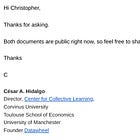
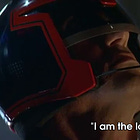
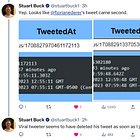
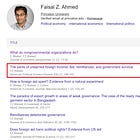






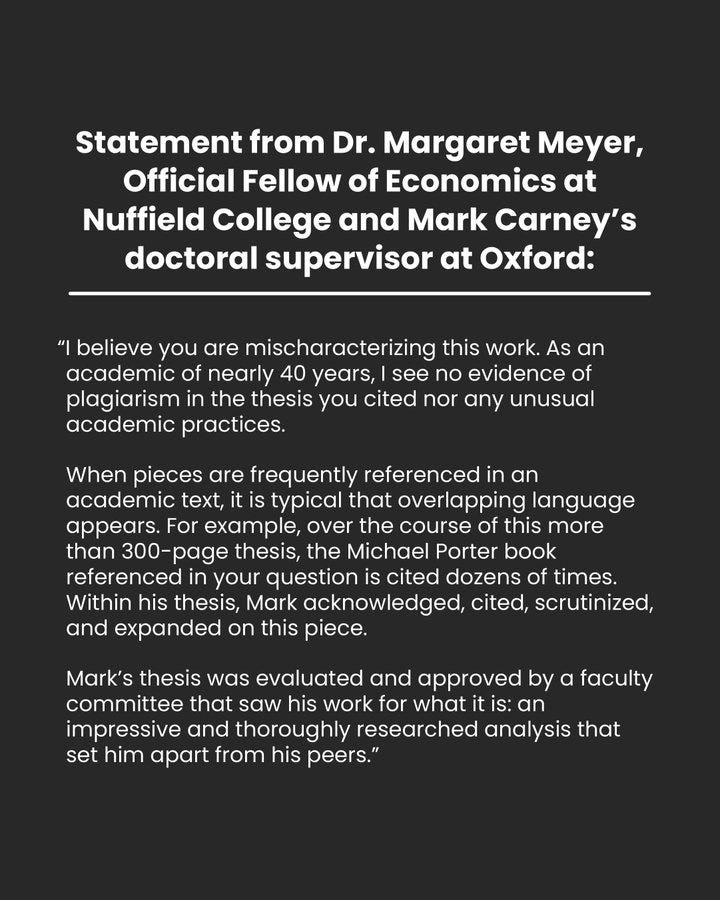

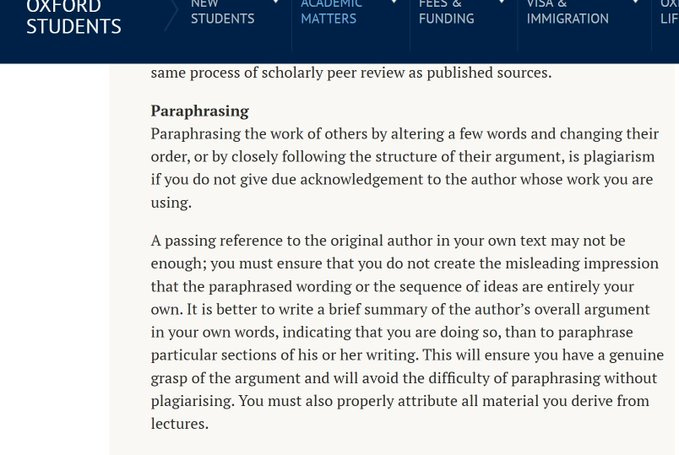
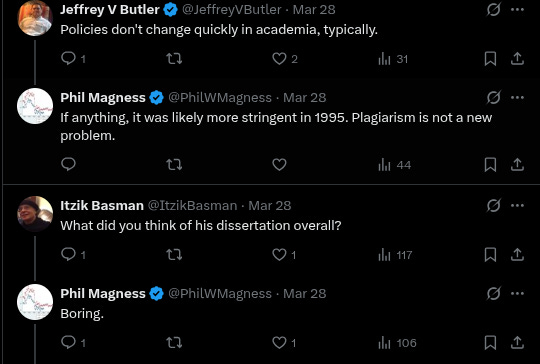


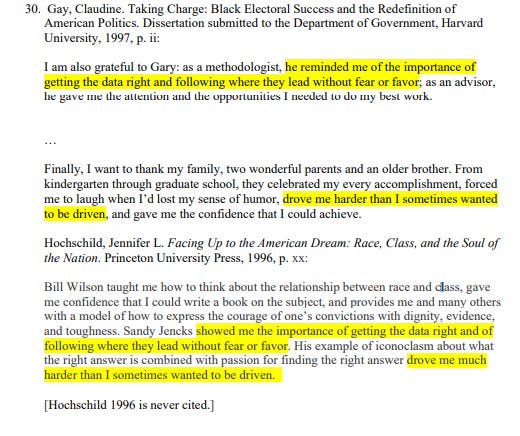
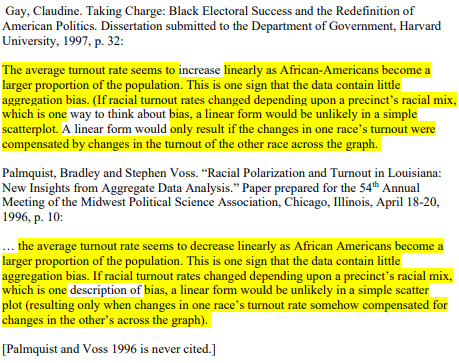




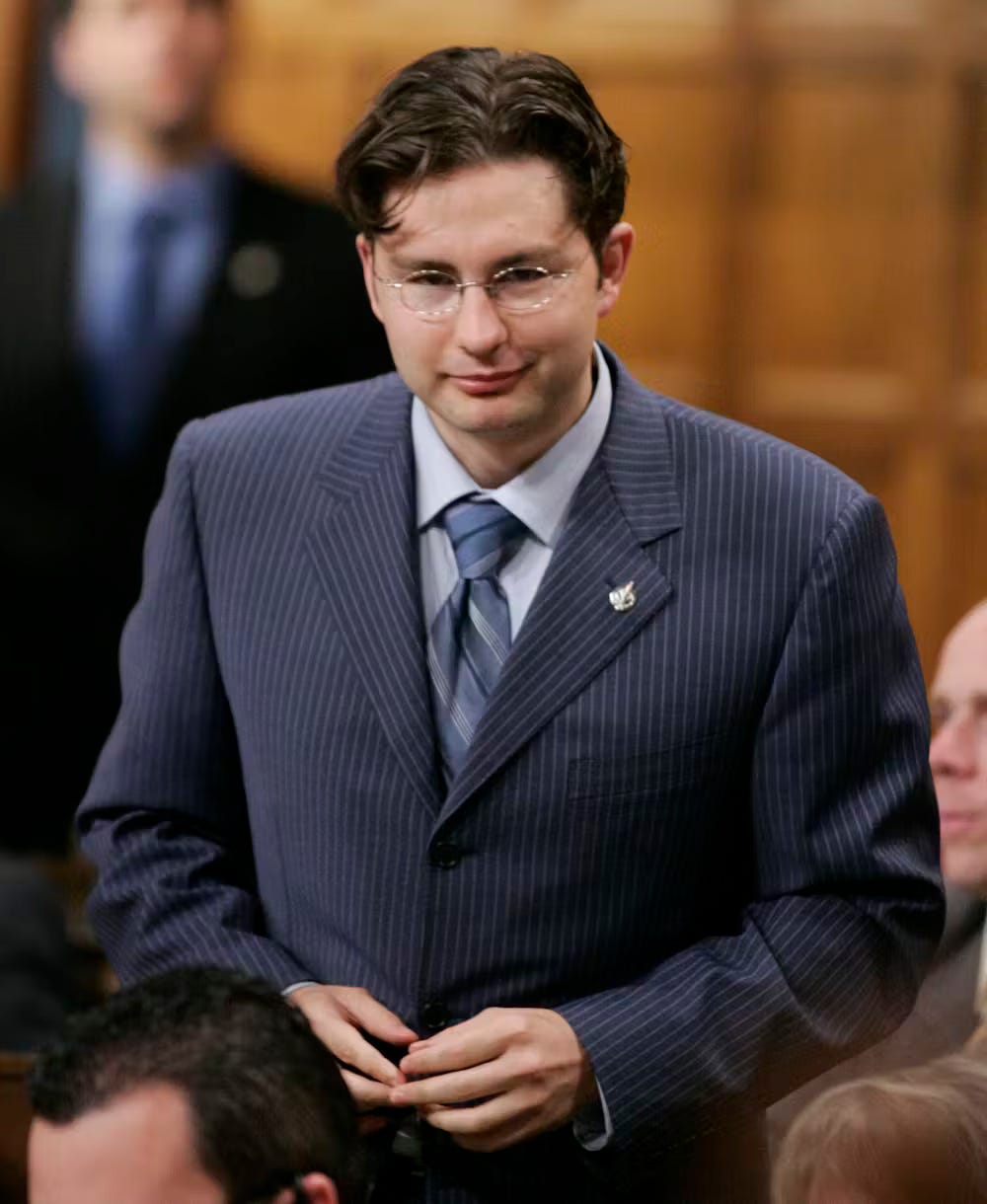
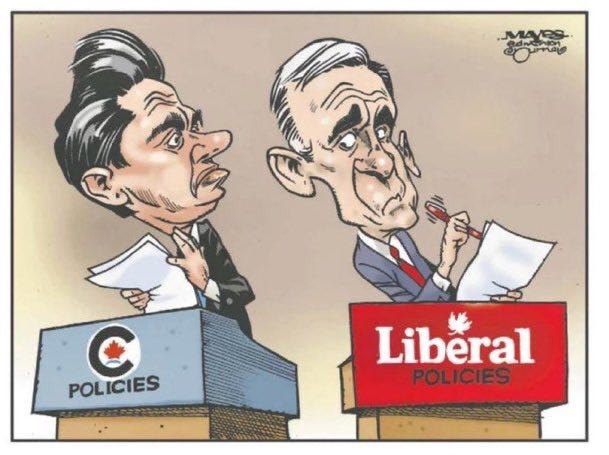
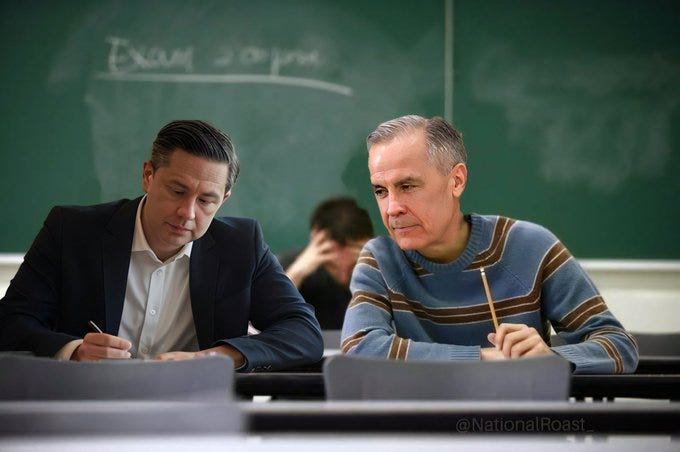

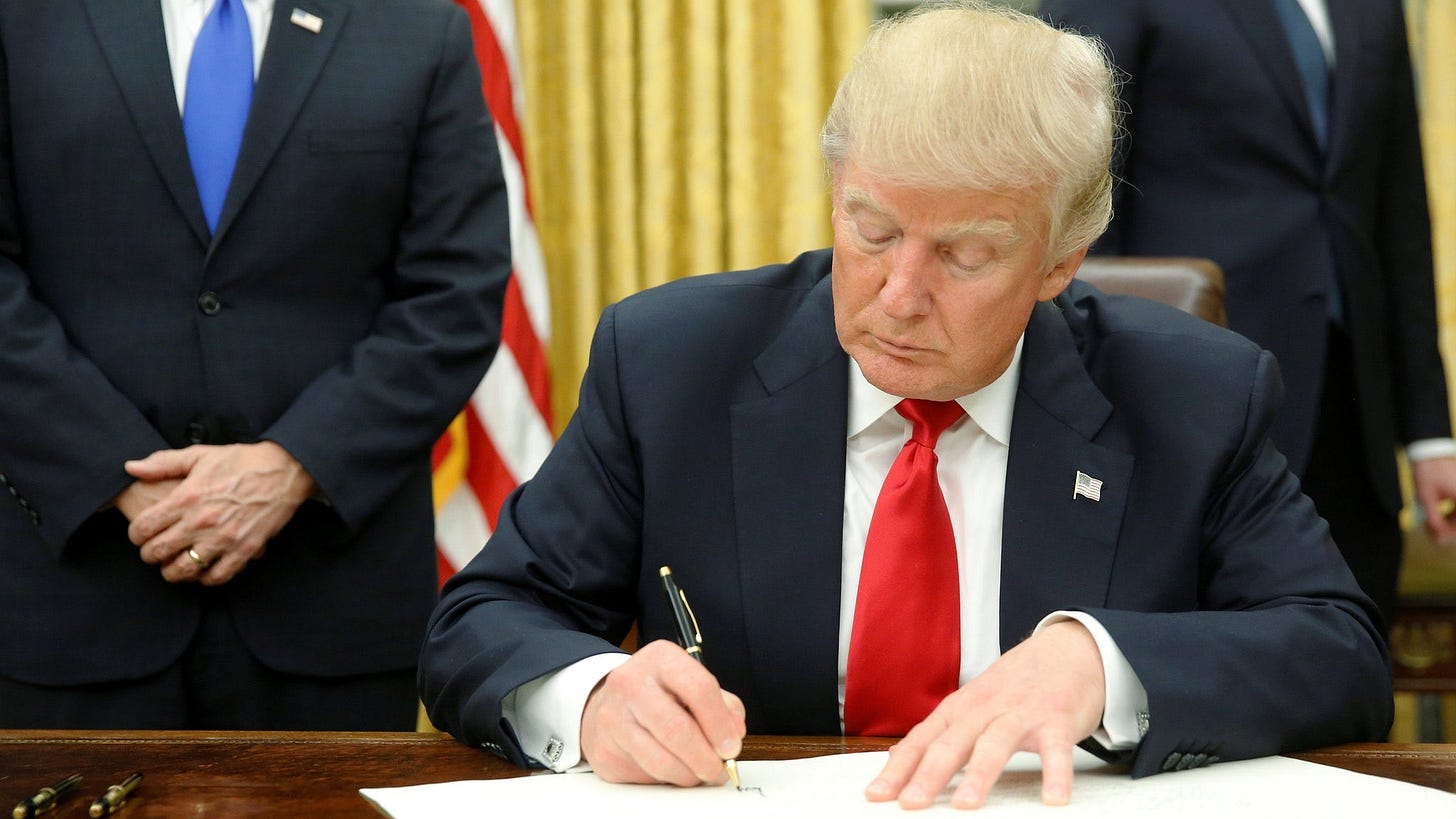
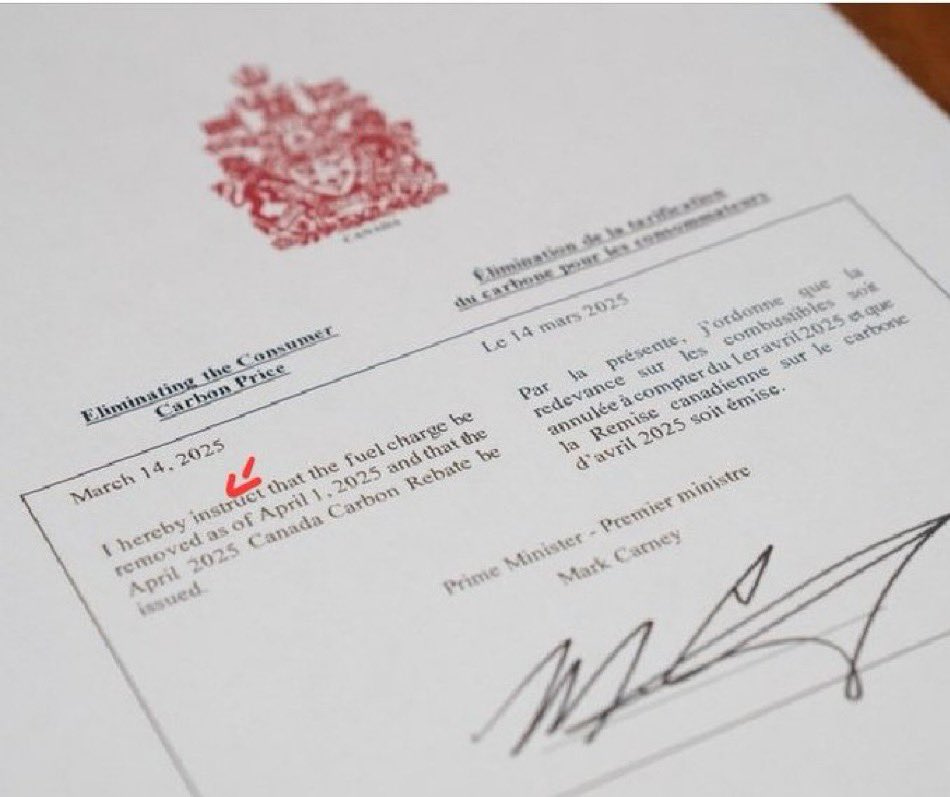
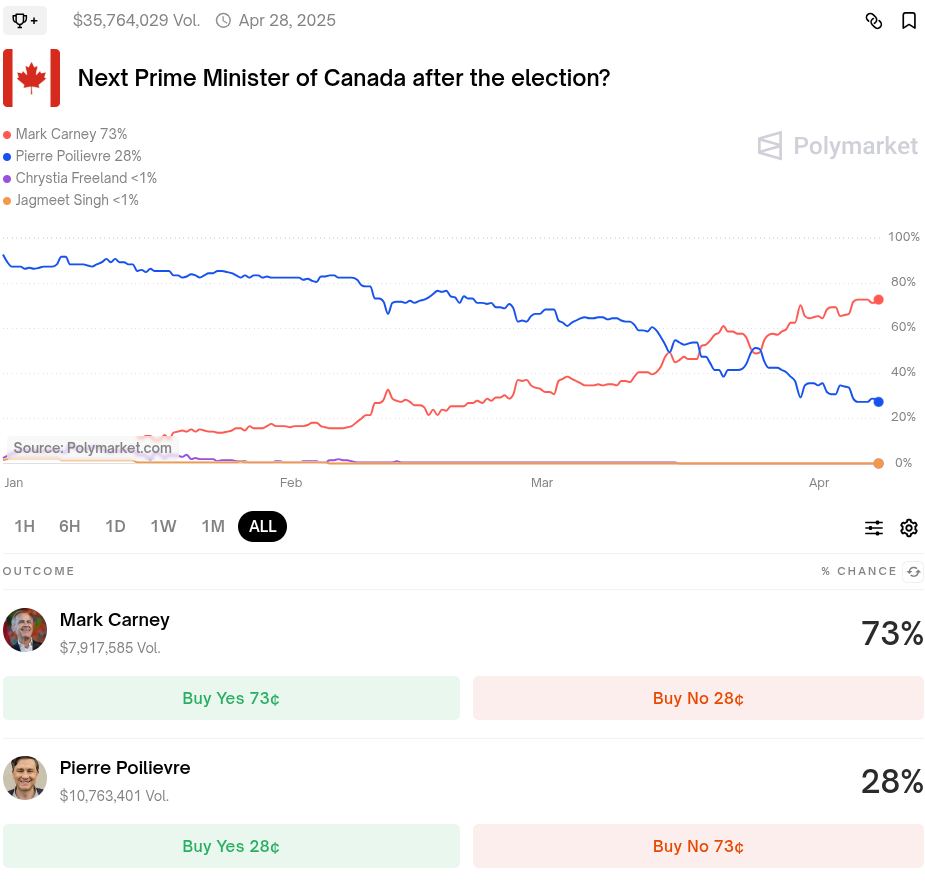


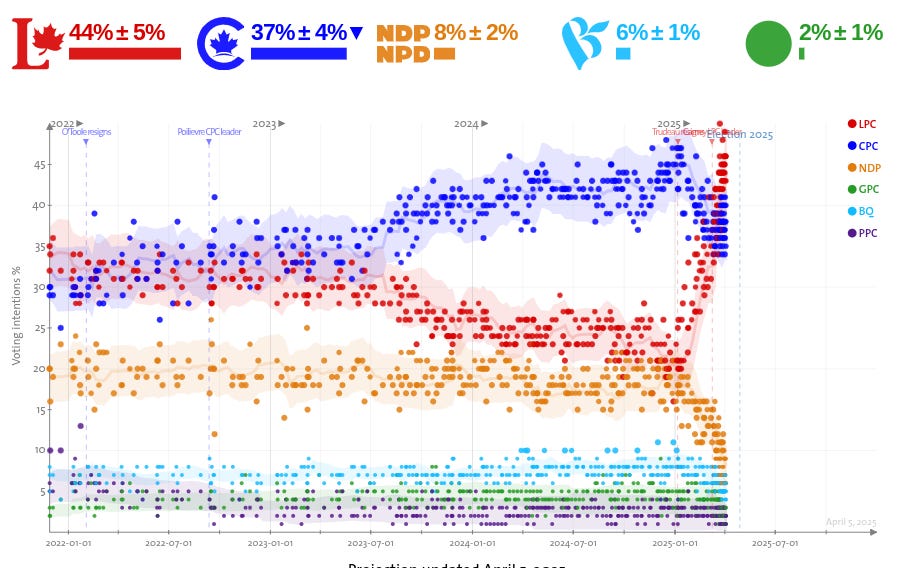
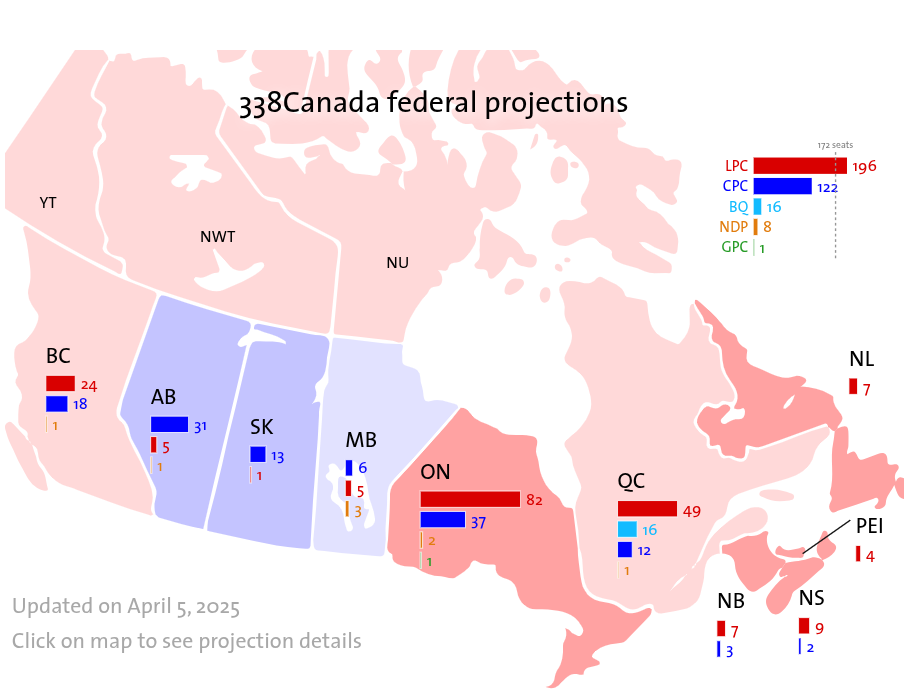

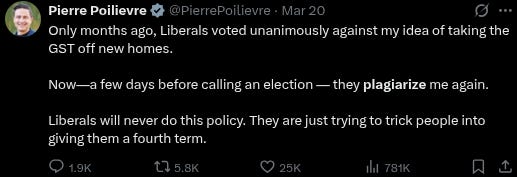


ZERO COMMENTS?
Wow? How gratifying it must be to have squandered that past 4 years of your life churning out these brain-dead blog posts that are of no interest!